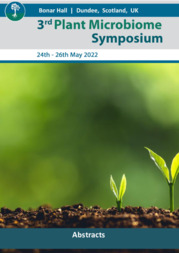Repeated exposure of wheat to the fungal root pathogen Bipolaris sorokiniana affects rhizosphere microbiome assembly and disease suppressiveness.
Repeated exposure of wheat to the fungal root pathogen Bipolaris sorokiniana affects rhizosphere microbiome assembly and disease suppressiveness.
Author(s): COSTA, L. S. A. S.; FARIA, M. R. de; CHIARAMONTE, J. B.; MENDES, L. W.; SEPO, E.; HOLLANDER, M. de; FERNANDES, J. M. C.; CARRIÓN, V. J.; BETTIOL, W.; RAAIJMAKERS, J. M.; MENDES, R.
Summary: Soil-borne pathogens induce plant disease suppression by enriching members and activating functions in the rhizosphere microbiome. This is observed in disease suppressive soils, which show a remarkable ability to naturally suppress plant diseases caused by pathogens. Here, we selected two wheat genotypes, contrasting for Bipolaris sorokiniana resistance, to study how the pathogen affects the rhizosphere microbiome. As expected, the cultivation of the susceptible wheat led to a significant reduction in disease severity after five successive cultivation cycles. Conversely, the resistant genotype showed the opposite pattern, increasing disease severity over cycles. While bacterial families Chitinophagaceae, Anaerolineaceae and Nitrosomonadaceae are associated with disease suppression in the susceptible wheat (fourth cycle), Chitinophagaceae and Comamonadaceae are associated with disease resistance in the resistant plant genotype (first cycle). Metagenome analysis revealed that 604 BGCs, out of 2,571 identified by AntiSMASH analysis, were overrepresented during disease suppression in the rhizosphere of the susceptible plant genotype. These BGCs are associated with biosynthesis of terpenes, nonribosomal peptides, polyketides, aryl polyenes and post-translationally modified peptides. The understanding of the rhizosphere microbiome dynamics during disease suppression allows the identification of key microbes and functions to be used in novel strategies to control soil-borne fungal pathogens.
Publication year: 2022
Types of publication: Abstract in annals or event proceedings
Unit: Embrapa Environment
Keywords: Bipolaris sorokiniana, Microbiome, Rhizosphere, Stress tolerance, Trigo
Observation
Some of Embrapa's publications are published as ePub files. To read them, use or download one of the following free software options to your computer or mobile device. Android: Google Play Books; IOS: iBooks; Windows and Linux: Calibre.
Access other publications
Access the Agricultural Research Database (BDPA) to consult Embrapa's full library collection and records.
Visit Embrapa Bookstore to purchase books and other publications sold by Embrapa.

